#kat's meta
Text
I am fully in support of all of those posts that critique fandom's obsession with making the clones completely Mandalorian in every way curse you Traviss, and I think it's valid to take a second look at the impulse, but I also take umbrage with the idea that the clones have nothing to do with Mandalorian culture at all. Literally the most visible clone in the whole of TCW wears jaig eyes, used the same way the Mandalorians use them, and so do multiple other clones. Multiple clones also picked Mando'a names for themselves, or wear traditional Mandalorian hairstyles, and Boil isn't the only clone who wears some sort of Death Watch insignia (which is fascinating in its own right).
There's just - nuance to all of it, I think. The clones aren't wholly Mandalorian, but they aren't not Mandalorian either. Whatever canon you want to take re: Jango and the trainers he picked, the clones clearly picked up bits of the culture from them, whether because of or despite them. Especially considering Mandalorian culture was largely spread through conquest originally, and adoption, the clones have as much of a right to it as anyone, and writing that off or ignoring the fact that at least some of them clearly do consider themselves part of the culture in some way removes a lot of the grey area from them as their own thing, imo.
The clones are a grey area, as a whole. I think that's part of the tragedy of them. They don't have one people who are their own except other clones. They don't have one specific homeworld or culture. They were created literally to die as cannon fodder, and they made themselves into a people despite that. Taking away one of the major pieces they incorporated into their lives (in strict canon, even if you want to ignore everything Traviss ever touched) is weird and overlooks a lot of what's presented about the clones in TCW.
They don't have to be perfectly Mandalorian in every way. That's just as much of an injustice to them. But removing the Mandalorian bits entirely strips away a lot of how they clearly see themselves, too.
#kat rants#meta#star wars#finally saw one too many 'how dare you portray the clones as mandos' posts whoops#anyway#the way the clones incorporate and relate to their mando heritage is fascinating and it deserves more than to be brushed off#just because some bits of fandom take it to the extreme#clone troopers
1K notes
·
View notes
Text
Why Katara's Lines Come Off As Rejecting In EIP
Like I said in a previous EIP meta, this will be a doylist meta and an isolated look into the scene and the second half of book 3. So first things first, what are Katara's lines and body language?
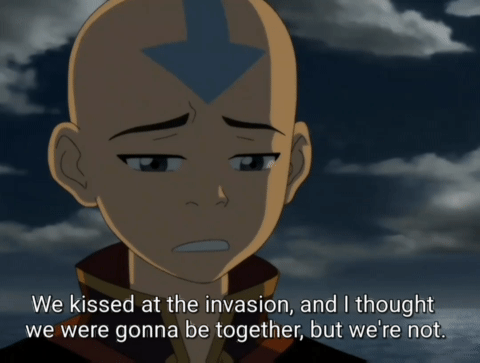
As soon as A\ang brings up the kiss, she turns away, and just says she doesn't know.

When he asks her why doesn't she know, she seems slightly irritutated for a second, gives him a perfectly reasonable explanation, but doesn't hold eye contect for too long before drifting off.

A\ang keeps pushing, so she puts an end to this. This time she stays faced to him to say she is confused, signifying she's more comftable now that his questioning has ended.
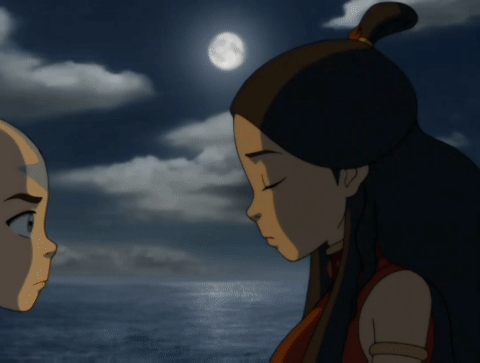
Now it is clear as day that A\ang violated her boundries and she is pissed off.
Her lines and body language tell us two things I wish to break down:
Katara is very uncomftable talking about the possibility of a future romance and can't commit to an answer.
The reason she gives is that she is because she's confused.
2. Katara States That She is Confused
Let's try to take her at face value here. She's genuinely confused about her relationship with A\ang. Do you know what is the first role of storytelling? Show don't tell. If the writers wanted to show us that Katara trurly is confused, we should be seeing Katara grapple with that.
It wouldn't break the "Will They Won't They" tension, if anything, it'd amplify it. We can see this in action all the way back in season one, where Katara also is confused and considers if A\ang is a possible partner.
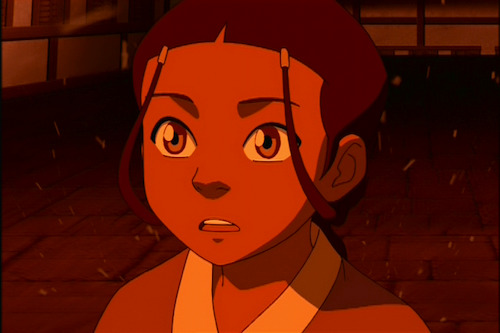
So, is that what we see? Small moment/moments of Katara looking at A\ang, being confused and considering him as an option? No, we do not. Instead, what we get from Katara, is...

We are told that Katara is confused, but what we're shown is Katara completely ignoring the source of her supposed confusion. What we're shown is not confusion, it's denial.
This is a sharp contrast to how well the writers made sure to remind us that Katara is still angry at Zuko over the course of these very episodes. From her threatening him when he first joins, to a mean spirited comment (at 0:21), there was a clear effort to keep up the tension, to make sure you know that Katara hasn't forgiven Zuko yet, until said tension is resolved. Meanwhile with Katara and A\ang what we see is the show, and by extension Katara, in denial to the whole event.
1. Katara is Uncomftable and Unable to Commit
If she is in denial and A\ang is making her face reality, would her behavior in the scene be compatible with that? Would she keep on avoiding the topic? Could her words register that way based on who she is? To know that, we could ask: does she have a history of shielding A\ang from reality?

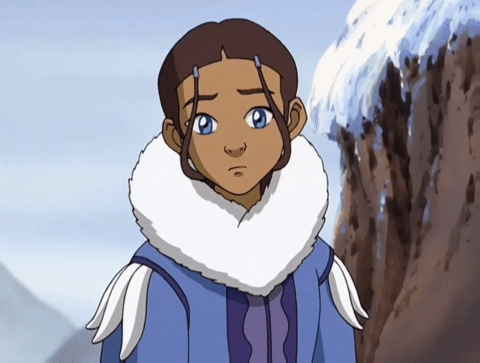
(If the scene was revealed to be her shielding him), this isn't to say that Katara would consciously shield him the way she does here, she could've genuinely thought she was confused. There would be many ways to interpret the scene. However, it is in character for her to want to keep the peace to protect him from being hurt. Therefore, her lines in EIP could easily register to be of a similar fashion.
The show continuously refused to show Katara being confused, showing us nothing but denial. When she is faced with the reality, she refuses to commit when having a history of trying to shield A\ang for as long as she can. And this is why Katara's lines in EIP come off as rejecting.
#anti kataang#anti kat@ang#anti k@taang#TAGGING FOR VISIBILITY->#zutara#zuko x katara#katara x zuko#zutara meta#pro zutara#anti anti zutara#zutara analysis#zutara evidence#zutara forever#zutara nation#zutara should have been canon#zutara supremacy#zutara was robbed#zutarian
244 notes
·
View notes
Note
Hello ma’am at Wendy’s; could you analyze some inukag scenes in the first movie? 😍
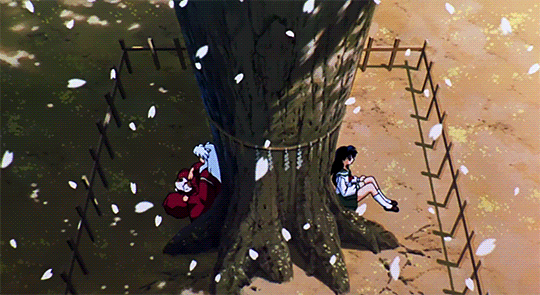
I could talk about how Inuyasha was strugling in the first battle — to the point of Shippo stating he's hopeless when Kagome isn't around — and how he headed back to it with renewed energy once she got there.
I could talk about how he bickers with her the entire time, but it's always so gentle while constantly carrying her away from danger — bridal style, no less — and asking her in that soft voice we don't ever hear him use with anyone else if she is alright even though he was the one just getting his ass beaten.
I could also talk about how he follows after Kagome when she runs off, supposedly to "give her a piece of his mind" yet doesn't deny it when Shippo counter arguments that she got him wrapped around her finger. I could. But that's just our everyday Inukag, so here are the scenes I feel like are worthy discussing on a deeper level.
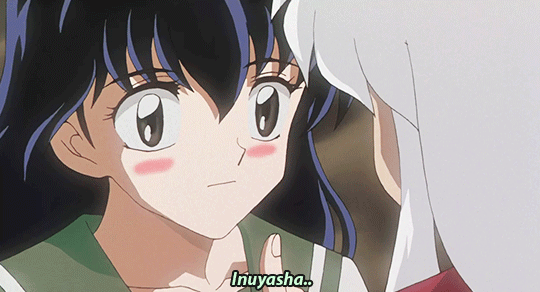
When Inuyasha found Kagome after she accidentally cut herself, he got closer, wanting to take a better look at her wound, but for a second there Kagome forgot about her injury and really thought he was going to kiss her. You can see her surprise at his sudden proximity and then the disappointment when he goes for her hand instead.
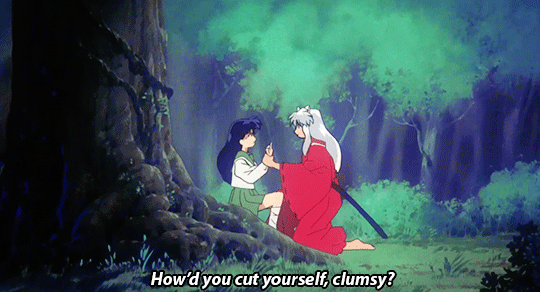
Then he took her finger to his mouth, to the place where his fangs are, without overthinking it or fearing any judgement, simply trusting that Kagome wouldn't be scared or disgusted by the gesture, by him. And she never does. What really makes this scene, though, is that Inuyasha is completely oblivious to the effect his actions are having on her so far or just how intimate they actually are.
Kagome's safety is his number one priority and Inuyasha feels comfortable enough with her to follow his instincts without reservations, so he doesn't quite realize the romantic implications because it's natural to him, to them, to be this close.
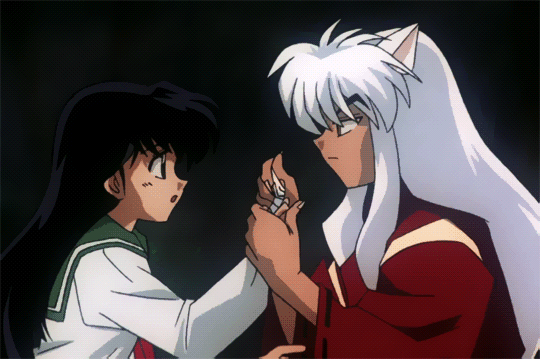
Then Inuyasha uses Kagome's favorite handkerchief to patch her up. Considering she sounds more upset about him ripping it to do so than surprised that he has it in the first place and that he doesn't seem embarrased to have it at all, my guess is that she must have gifted it to him at some point.
And even though he claims it's just a piece of cloth, the fact remains that he carried it with himself for who knows how long — probably because it smells like her — and kept it intact despite the many battles, that is until she needed it as a bandage and we get visual confirmation that Shippo was right: Kagome literally got him wrapped around her finger.

Flash forward to the bridge scene, where Inuyasha thinks he's seeing Kikyo at first, then notices is actually Kagome in priestess clothes and runs to her. If you ask me, it's pretty telling that he'd only mistake the two of them when Kagome isn't acting like herself.

I love his reaction to realizing Kagome is there, safe and sound. He's just so genuinelly happy and relieved to see her. Those aren't emotions we're used to get from him. Plus, he worries about her being pale and insists that she gets back to Kaede's so she can get more rest.

Then when Kagome hugs him, he apologizes — which we also don't see him do often — for not getting to her sooner, thinking that's what earned him that hug. And he returns her embrace in true Inuyasha fashion: tight and cradling her head.
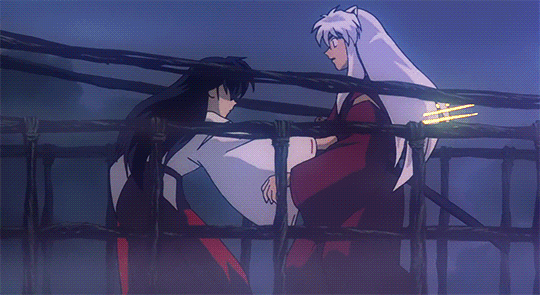
That's when Kagome pulled this little trick and I think two things are worthy noticing. One, she managed to break free from the mind control long enough to tell Inuyasha to get away. That's quite impressive. Two, when confronted with the idea of Kagome betraying him, Inuyasha came to the only possible conclusion that she was under a spell, never once doubting her.
He makes one attempt to reason with her, pleading for Kagome to snap out of it, but when that fails, he doesn't even try to immobilize her or adopt a defensive stance, he just runs, flat out refusing to lay a hand on her, the opposite of his fighting style.
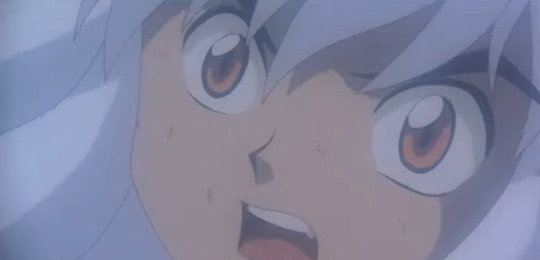
And even though Inuyasha knows Kagome is being controled, I still appreciate his reaction to hearing the one person who makes him want to live telling him to die. Not to mention how it brought back some very unpleasent memories. Speaking of which...
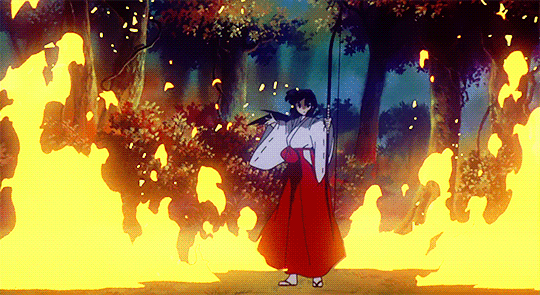
What's interesting about this scene is that, again, Inuyasha knows this is Kagome attacking him — although against her will — but the very idea of her hurting him is so inconceivable that Inuyasha tries to make sense of it with the situations he has experienced before.
Then Kagome explained she has no control over her body and just can't stop, begging him to run again before it's too late. Inuyasha, however, wouldn't hear it.
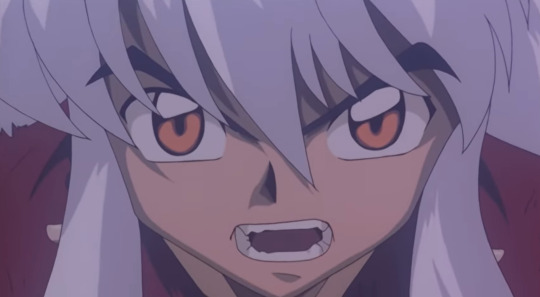
"I'm not running. Not without you. I won't leave you behind."
And honestly, who would have blamed him if he had run? Certainly not Kagome. She understands better than anyone just how difficult reliving those old traumas must be for him. Yet he would rather stay and die by her hands than leave without her.
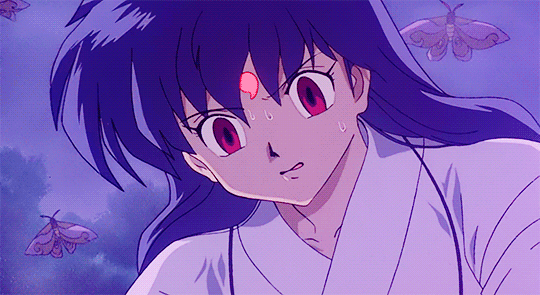
That's why she fought so hard against the spell here, in a way she couldn't quite fight when it wasn't Inuyasha's life on the line. Until the very end, she refuses to be the one to cause Inuyasha the same harm he has suffered before. But she ultimately fails.
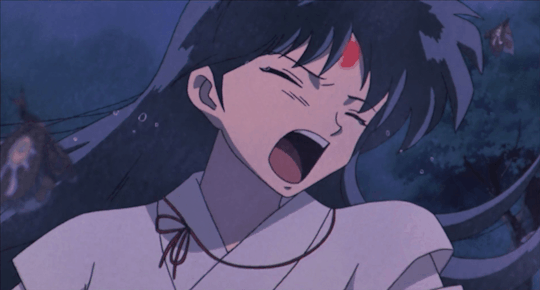
It's only after Kagome realizes what she's done that she manages to break the spell. It's very meaningful that she screams his name the exact moment it happens and that her eyes were full of tears even before she shot that arrow.
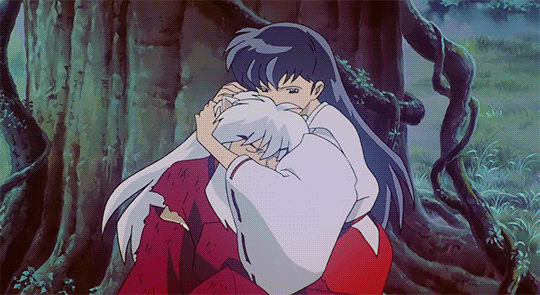
She runs to Inuyasha and wraps him into one of my favorite Inukag hugs ever. The position they're in is so intimate, it's like she wants to melt into him and protect him from the entire world while begging him to say something and open his eyes, chanting how sorry she is.
It also parallels the scene in the beginning. Same spot, similar situations. Except where once was Kagome injured, now is Inuyasha and where once was him patching her up, now it's her who is taking care of him.
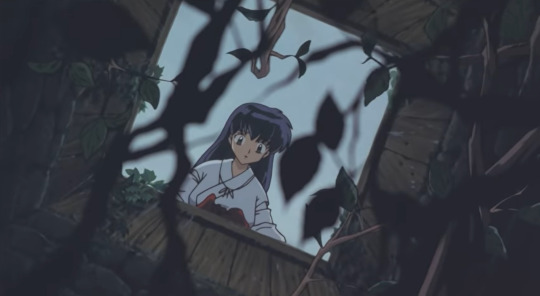
Kagome doesn't let go of Inuyasha for a good while and when Kikyo tells her to return to her own time, since she doesn't belong there, Kagome answers that she won't, that she can't leave Inuyasha — echoing his words from earlier.
Even after Kikyo explains that once the well it's covered over, Kagome won't be able to return to her own world anymore, she is still reticent about leaving Inuyasha and Kikyo has to literally force her out.

"Inuyasha! My hands can't touch him anymore. My voice can't reach him anymore. I won't see Inuyasha ever again."
I absolutely love how classic Inukag this quote is. You have Kagome saying his name twice, a mention of touching, which is a huge part of their love language, a nod to her voice reaching out to him, which is a recurrent theme for them and "I won't see Inuyasha ever again" as opposite to our many "I want to see Inuyasha once more."
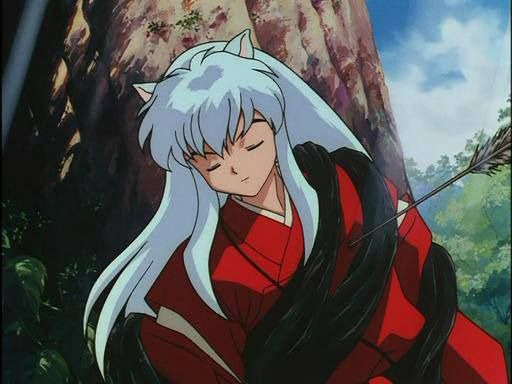
Another thing I love is how this scene mirrors the one when Kagome first meets Inuyasha: unconscious against the Sacred Tree, her hand reaching out to him. Except then she ended up saving him later and now she was the reason he was there.
Then we finally get to the reunion scene, the heart of "Affections Touching Across Time" which by the way is such a great name for the movie! Not only is it poetic, but it also paints Inuyasha and Kagome's relationship as the transcendental love story that it is. As if no matter the circumstances, it's inevitable for the love the feel for each other to find its way back to them.

Inuyasha wakes up and Kagome is his very first thought. For her part, Kagome is also able to feel Inuyasha through the tree.

"I can feel him. I can feel Inuyasha."
They start to talk even though they're years and years apart, Kagome asking if he is okay and Inuyasha brushing her worries off as usual. He then says he's surprised she isn't there and when Kagome says she came back home, he teases her about being scared.
Kagome denies it and I believe it's because she was initially thinking about the dangerous situation they were in, but then images of Kikyo telling her to go home and kissing Inuyasha flashes through her mind and she admits that e was right, that maybe she did run away.
She did get scared, but not of the danger they were facing. She was scared to find out Inuyasha was truly in love with Kikyo and that, since Kagome hurt him, he would be better off without her around.
Once Kagome explains that to him — minus the Kikyo part — Inuyasha gets up despite his wounds and tries to make his way to her, but Kagome meets him half way.
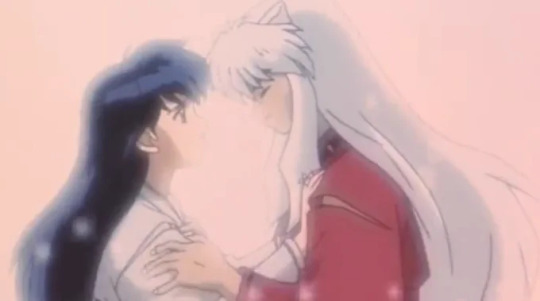
@kitramune pointed out that Inuyasha smiles at her reaction because not only he knew she would do so, but he also expected her to in order to pull her into a hug.

"I need you with me, Kagome. Haven't you realized that yet?"
Their hug is also a perfect replica of the original one, their very first one. From Inuyasha having a wound on his chest to catching Kagome completely off guard, first pulling her towards him then embracing her tight.

The scene is a masterpiece overall. The music, the dialogue, the voice acting — both in japanese and english —, the emotional conflict. It keeps me wishing it had happened in canon every time I watch it.
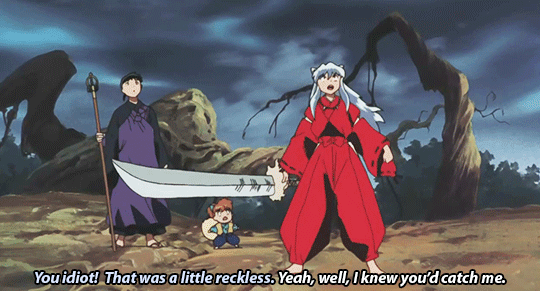
And I can't in good conscience leave the ultimate trusting exercise out of this. That Kagome trusts Inuyasha enough to jump into his arms from great heights it's pretty amazing in and out of itself, but the reason her confidence in him is so high is because he delivers it every time. It's all very reciprocal.
And even though Inuyasha complains about her being reckless, I love that he doesn't even bother to sheathe Tessaiga — his most valuable possession — too focus on catching Kagome in the gentlest way possible.
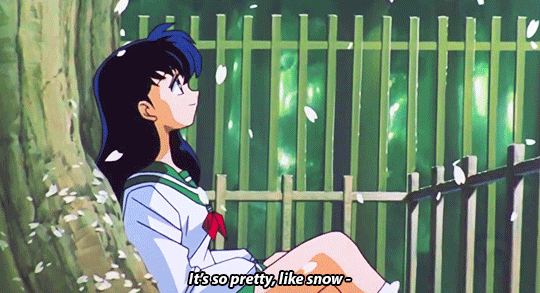
Last but not least: the extra scene. In the beginning of the movie, we hear Grandpa Higurashi say that the Sacred Tree would blossom every single year without fail, until five hundred years ago, when Inuyasha was put under a spell and fixed to its truck, to which Kagome replies that now its flowers are blooming again because she set Inuyasha free.
The blossoms represent just that: a counterpoint to the snow that once fell over them. They're both pretty but where the snow is cold, the petals are warm. Where one is winter, the other is spring. Where one is the end of a cycle, the other is rebirth, it's life.
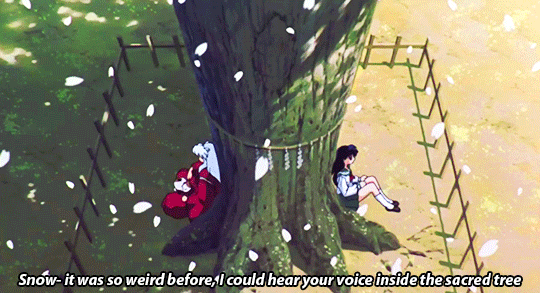
I hope putting Inuyasha on the shadows and Kagome on the sunny side of the tree was a conscious creative choice here because it accentuates their personalities and the yin and yang dynamic of their relationship, on top of being aesthetically pleasing.
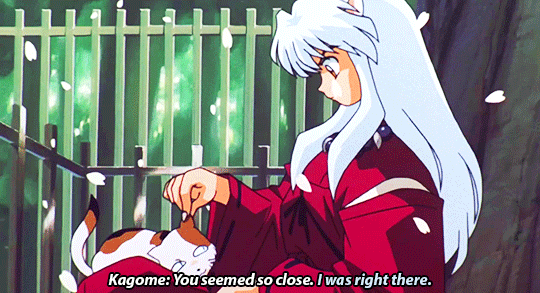
I especially enjoyed how reassuring and straight forward he was here, like it was a given that he would be there for and with her even if it couldn't be physically, like he couldn't fathom any other way.
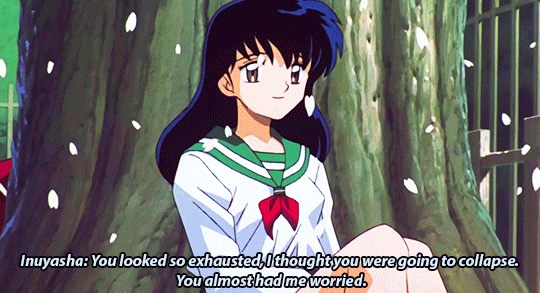
And of course, there's the way Inuyasha is so aware of her and constantly worried about her well being, noticing how exhausted she was and being concerned she might collapse while having a severe injury on his own chest.
HONORABLE MENTIONS: Sango telling Kagome to be careful and Kagome replying that she'll be fine because she'll be with Inuyasha. The villain saying "I've never seen anything more pathetic than a half demon cuddle by a mortal girl" and Kagome going "why? What's wrong with us being together?" Kagome still feeling awful about hurting Inuyasha and thanking him when he insisted that "it's barely a scratch."
#I've watched the Inuyasha movies once each#And I never really planned on revisiting them because to be honest I don't particularly consider them canon#Plus the animation was atrocious at times#So I figured I'd just rewatch the most memorable scenes whenever I feel nostalgic#But I watched the whole thing for you Kat#And I actually had a great time doing it#Inuyasha#Sidmailing#Affections Touching Across Time#Kagome#Kagome Higurashi#Inukag#Inumeta#Inukag meta#Inuyasha meta#Kagome meta
175 notes
·
View notes
Photo
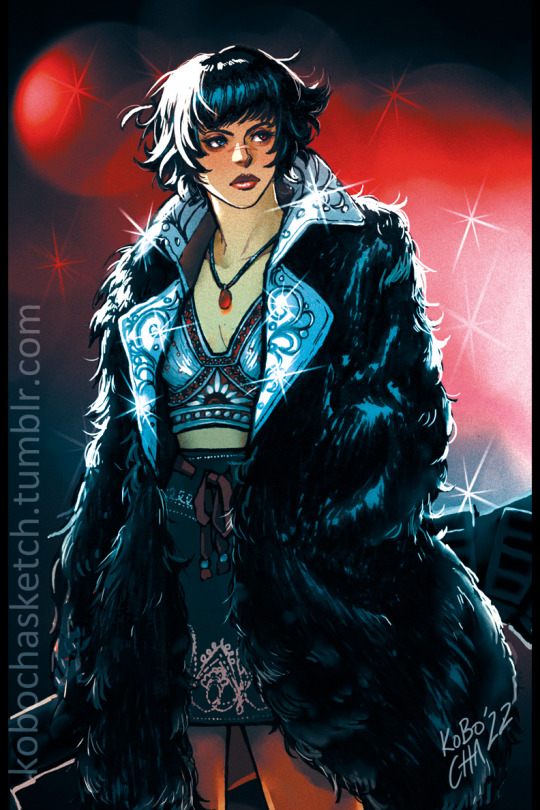
A cool Lady rockin’ a fur coat!
(inspired by @fabdante‘s lovely Devil May Cry art of all the various fun alternate outfits and fabulous fur coats!!!) ;D
#devil may cry#dmc3 lady#dmc3#devil may cry3#artists on tumblr#hello all!! I hope you've been well! Please take this modest offering after *checks watch* a long time!!! hfbvhjfbghgb#I actually drew this way earlier this year but various things had it slide onto the backburner#fabdante's art really inspired me to want to do my own 'dmc character in an awesome fur coat'-#the decadence! the floof!#dmc character in alt outfit#(and before you have to wonder- I have absolutely considered kimono outfits for everyone nbgjrthbgh)#I had originally planned on drawing ReDante or Kat- but ended up drawing my girl Lady instead#I think a fur coat suits her really well ya know?#it was originally drawn in my sketchbook with the fur having been done with a brush pen :D#I tried to keep it on brand colorwise...and actually languished a good while on whether or not to make the fur white or not#I ended up going for the dark fur obviously but with contrasting white lapels meant to kinda invoke the dmc5 jacket a bit! :D#oh and while not my original intent- I can't help but think 'band au' when I look at this now nnfbfhg#anyway!#big thanks to fabdante for keeping up the cool art/meta pots/ and reboot kid art! we love to see it!!! ;DDD
1K notes
·
View notes
Text
Layers of Death
Back from vacation! First of all, what the hell happened to the dashboard. this is so ugly, what the fuck
second, I come bearing a gift!
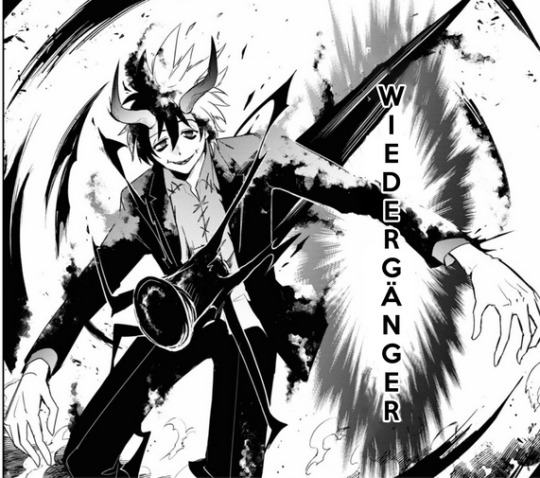
Specifically about this little word right here, and how clever its use actually for this transformation actually is
The Wiedergänger, as hello-kitty-vampire noted in her translation notes, shares many similarities with the strigoi and is your prototypical "vampire" creature you'll find in many places (kind of makes you wonder why so many different cultures have different versions of the same creature in their legends and where it originated from). The Wiedergänger itself it more of a "ghost," in some regards, arising from a corpse who has unfinished business, typically one where they seek to right some injustice done to them in life, such as Adam being murdered for an action he didn't commit, along with his body being defiled by germaine after he was buried. Germaine is guilty of very, very many accounts of abuse of a corpse.
Ahem.
the real meat of this, for me, is of course the overlap between the wiedergänger and the norse draugr (as if i ever talk about anything else). Unlike your strigoi, wiedergänger, jiangshi, or the mananaangal, just to name a few, the draugr isn't defined by life force sucking, but by their ability to inflict their own state of being, of undead-ness, upon others like a disease. they're also noted for being, well, corpse colored lol, ie, being black or deep blue, the signature colors of our boys up there. Their abilities include shapeshifting, dream walking (and will sometimes leave a physical gift as proof of their presence), and notably will o wisp will mark the boundary between the world of the living and their territory. Why is this notable? Because the "will o wisp" we hear of is the very same foxfire you'll also find in japanese folk tales, an eerie blue fire who leads travelers astray... Much like the blue fire Inner Sloth uses in battle!
One last thing. In the Hrómundar saga Gripssonar, the berserker of the tale transforms himself into a troll which blew fire and possessed long, black claws, leading to the hero to describe the draugr as a sort of cat like entity.
PS: rip mahiru, another legend about these ugly critters is that they would transform into a cat which would grow heavier and heavier as it sat upon its sleeping victim's chest until they suffocated. Cats... Really haven't changed ever, have they?
88 notes
·
View notes
Text
Kat's Catholic Commentary - Part (I've lost track)
My focus for this episode will be on Lestat's speech in his parting letter to Louis.
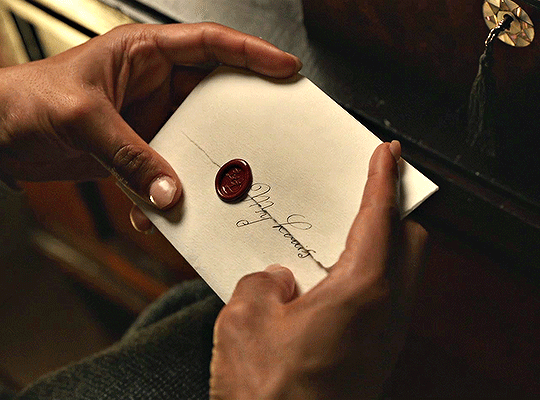
The purpose behind the letter may vary depending on when it was written (before or after Lestat knew of Louis’ plan of betrayal). However, my focus is on the language used - specifically “the veil” - and why my Catholic senses were tingling.
But first - the disclaimer:
This is purely a fan meta/theory. Even when I talk about character motivations with some certainty, remember it's just my take, not a fact-based declaration. This helps keep things brief rather than saying "in my opinion" before every other sentence.
All points and takes are valid - this is just one of them. I'm exploring one potential aspect of Lestat and Louis' relationship, not the whole picture or even trying to suggest it as the main foundation.
Also, there are frank references to the Catholic Church, its history, practices, sacraments, and some Bible verses. If at any point you need to take a step back for self-care, please do. Your well-being comes first.
Before diving in, I’ll share why I see a potential for a secondary meaning behind it because I’d like to add some weight to my personal fan theory that Lestat is conscious of how faith is still an integral part of Louis’ identity and how he might use it (however the purpose of this, I’ll leave to the reader).
Several moments in the first season, and some from the books (spoilers ahead if you’d like to avoid events after IWTV), reference Lestat and Louis’ relationship and his faith (and especially with a context of Catholicism):
The entire monologue at the end of episode one as Lestat declares his feelings for Louis in front of the altar.
Lestat’s monologue of Saint Louis (both as an off hand reference in ep 1 and the expanded version of Ep 2 that ends with: “You’re challenge every sunset St. Louis, and I’d have it no other way.”)
After Louis asks about Antoinette in Ep 3, when Lestat is describing the need for various forms of pleasure for “anything that wards off the dungs of the everlasting road we walk” - pauses to point out Louis’ form of pleasure as “Pleasures of the Good Book by the fire for you.”
And then in Ep 6, when Lestat arrives to gift Louis something from his favorite bookshop: “‘The Book of Hours.’ Extremely rare, 15th century.” - the Book of Hours, is also known as the Liturgy of Hours, or Divine Office, used by both clergy, religious and laity alike for daily devotions on a rotating cycle for uniform prayer.
And from the books:
In IWTV, Louis’ reference to following Lestat as a kind of personal Jesus:
I allowed myself to forget how totally I had fallen in love with Lestat’s iridescent eyes, that I’d sold my soul for a manycolored and luminescent thing, thinking that a highly reflective surface conveyed the power to walk on water.
“What would Christ need have done to make me follow him like Matthew or Peter? Dress well, to begin with. And have a luxurious head of pampered yellow hair.
Later, in Prince Lestat, when they are reunited, Louis says (from Lestat's POV):
He leaned close to me, and he put his hand on my arm. “ ‘Wither thou goest, I will go, and where thou lodgest, I will lodge; thy people shall be my people’; and because I have no other god and never will, you shall be my god.”*
* This quote Louis is saying is from the Book of Ruth: She answered, "Do not be against me, as if I would abandon you and go away; for wherever you will go, I will go, and where you will stay, I also will stay with you. Your people are my people, and your God is my God.” - Ruth 1:16 CPDV
I’ve also shared metas and commentary on Tumblr and Twitter about Louis and Lestat's relationship to faith and the little nods I’ve picked up here and there (more on that below). But this isn’t intended as a comprehensive summary, just a soft recap to add context for anyone wondering, “how did she read that in this scene?”
Now, onto the main point! For anyone needing a refresher, here’s the letter in full:
In the event that you are reading this, something dreadful has occurred. Which is not my own death, but rather, the fact that we both now exist in two different worlds. Do not waste your life seeking revenge on the person or persons who did this. Do not give them the satisfaction of the hunt. Let treachery eat away at them from within. And you, you go carry on with your living. Know only this, mon cher: you are the only being I trust, and whom I love, above and beyond myself. All my love belongs to you. You are its keeper. A veil will now forever separate our union. But it is a thin veil, and I’m always on the other side, face pressed up against your longing.
Setting aside the beautiful writing, the language used, and the sentiments declared (it fed my Words of Affirmation love language meter well), my second thought upon hearing “A veil will now forever separate our union. But it is a thin veil, and I’m always on the other side, face pressed up against your longing.” was what my Catholic senses were tingling.
In a previous meta I discussed how I viewed the scene of Louis’ turning as a nod to the Sacrament of the Eucharist (though I can also see the other fan theory of the Sacrament of Matrimony). This furthers my idea of Louis viewing Lestat as a kind of personal Jesus. Given the examples above, I believe there might have been some intention behind Lestat’s words to reach Louis on a vulnerable level through his faith.
But why would former Catholic altar boy Louis catch that meaning, and what would it mean to him?
In the Catholic Church, the Eucharist is veiled in order to symbolize the mystery and sacredness of the Sacrament. The veil represents the separation between the divine and the mortal, indicating that the true essence of the Eucharist (Christ's Body and Blood) is hidden under the appearance of bread and wine (and it’s a practice that dates back to early Christianity, where the veil also served to protect the Eucharist from desecration and to enhance the reverence of the faithful during Mass).
As Catholics, we believe that Jesus, at the Last Supper, instituted the Eucharist, when He said, “This is my body, which is given for you. Do this in remembrance of me” (Luke 22:19). He also said, “This cup is the new covenant in my blood, which is poured out for you” (Luke 22:20). They were declarations to emphasize the sacrificial nature of the Eucharist but also to serve as a message of hope - that there would be an intimate connection between Jesus and His followers, despite His physical absence after His death and resurrection - “And surely I am with you always, to the very end of the age” (Matthew 28:20).
Though death might separate the physical presence, the Eucharist provides a continuous, though veiled, connection with Christ. This then allows the veil to symbolize hope and assurance that, while there may be a separation, it is thin, with the promise of a deeper, spiritual communion that transcends physical boundaries.
So, if Louis potentially viewed the Dark Gift as a kind of Eucharist that nourishes the soul, given to him through Lestat, then their spiritual interconnection and the nourishment it provided could continue. His devotion to Lestat would not need to end.
I believe Lestat “I went to a monastery to become a priest” de Lioncourt, knew exactly what he was doing when he used those words to describe how interlinked they would remain.
This furthered Louis’ (perhaps even subconscious) view of Lestat and Jesus - and himself as potentially Judas (meta here, and here), though I personally enjoy the view of Louis identifying with Mother Mary the most (visual reference and poem, art and another art piece here).
Whether intentional or not, or perhaps a completely different point that I read too much into (which can definitely be the case lol), it spoke to me on a deep level when I heard it. I’d like to believe it did for Louis as well.
#iwtv meta#my iwtv meta#kats catholic commentary#loustat#louis de pointe du lac#lestat de lioncourt#ldpdl#the vampire Lestat#iwtv#iwtv amc#iwtv 2022#interview with the vampire#iwtv spoilers#cw religion#religion cw
52 notes
·
View notes
Text
Queerwolf By Night: Queercoding, Media Literacy, and Werewolf By Night
Okay, @bluemoonperegrine got me thinking about a thing, so it's time for Media Studies And Writing Hacks With Kat. Grab your beverage of choice, and let's talk about queercoding in Werewolf By Night.
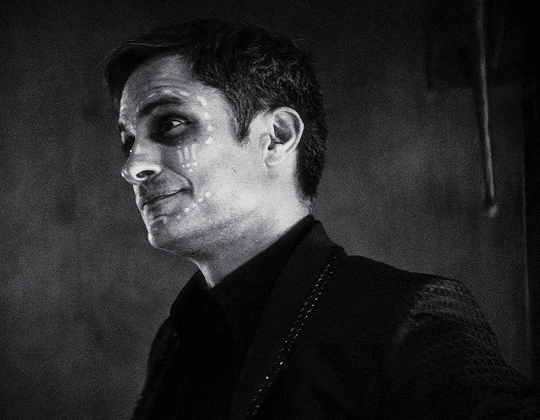
Let's start with a definition, because queercoding can sound like a conspiracy theory if you don't understand the context. In media studies, "coding" means using indirect means (usually details) to imply a state of being without explicitly stating that such a state exists. For example, if you're watching a TV show about a group of high-school friends, and one of the characters is consistently dressed in more expensive-looking clothes than the others, is more familiar with elite cultural signifiers like designer brands, and casually drops statements like, "Oh, yeah, I met him in the Hamptons last summer," then that character is being coded as wealthier than the others. Now, if a knowledgeable character SAYS, "Oh, that's Amelia, her family's rich," then it's not coding anymore. Amelia isn't wealthy-coded; she's just wealthy. Coding is only coding if the state of being is IMPLIED.
Now, why would anyone use coding when explicit statements are an option? Why can't people just say Amelia is rich? There are a number of reasons. First, maybe there isn't time or space to establish every single detail of a character through dialogue. Maybe Amelia's wealth is important to the story, but less important than the fact that she's dying of cancer, or in unrequited love with another character, or obsessed with rubber ducks. Or, second, maybe the coding is a setup for some kind of surprise or reversal. Maybe Amelia wears fancy clothes and has summered in the Hamptons, but surprise! Her parents just went to federal prison for fraud, and she's now penniless and sleeping on another character's couch, with no one mentioning it at first because it's painful for her.
And finally, there's arguably the most famous reason for using coding in media: because you literally can't be explicit about it. Let's talk about the Hays code.
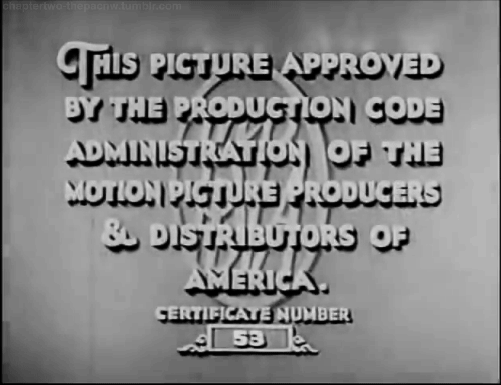
The Motion Picture Production Code, widely known as the Hays code, was a set of mostly self-imposed rules restricting the content of Hollywood movies between the 1930s and the 1960s. There was effectively a censorship board in charge of approving, disapproving, and demanding changes to films. The Code arose in response to a moral panic about sex and violence in movies; studios instituted the censorship board as a preemptive measure to head off possible censorship legislation. At the time, movies were such a new art form that there were serious concerns that First Amendment free-speech protections might not apply to them, so studios came up with this self-censorship system to avoid dealing with external censorship.
And what guidelines did they choose, you may ask?
Essentially, the guidelines were the conservative Catholic values of the 1930s. Yes, Catholic specifically; the man in charge was Catholic and talked a lot about how he applied his personal values to the task. So the Code included rules like a ban on insulting or denigrating religion or its institutions, among other things. There were also restrictions on what kind of crime and violence could be displayed, sex rules so strict that even married couples couldn't be shown in the same bed (if they even sat on a bed together, they had to keep at least one foot on the floor), and you KNOW there was a ban on anything gay. It was called "perversion" in the text of the code, but it meant gay stuff. Or trans stuff. Or kink. Or women being interested in sex. You get the idea.
But there was an exception to all these rules, and it was that more "objectionable" traits were allowed for villains. After all, a film isn't endorsing murder if the murderer goes to jail at the end and everyone stands around saying, "Wow, murder sure is terrible!" Right?
Yeah, what happened in practice was that filmmakers started giving villains and monsters traits that were stereotypically associated with queerness, supposedly to heighten how eeeeeevil these characters were, but actually for any number of other reasons. Apropos of absolutely nothing, here's Peter Lorre being extremely heterosexual with a cane in The Maltese Falcon.
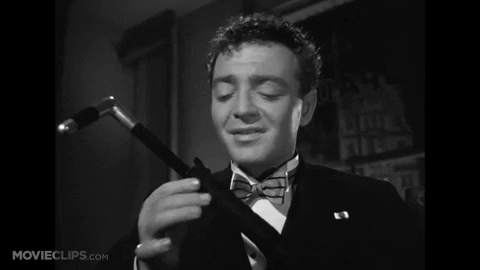
Now, how does this relate to WBN? Well, we all know WBN is an explicit love letter to 1930s and 1940s horror movies. If you don't believe me, here's Lon Chaney Jr. in 1940:
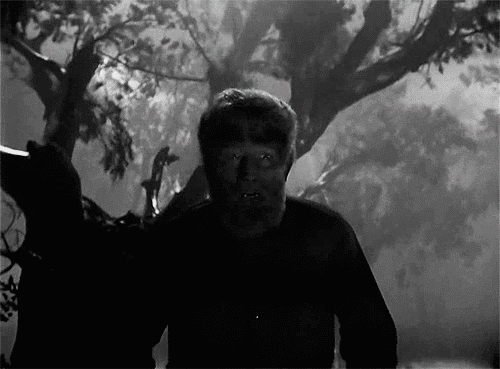
And here's Gael Garcia Bernal in 2022:
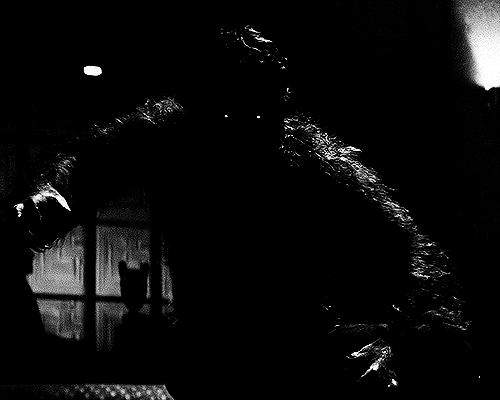
So let's talk about queercoding in classic Hollywood horror movies.
Obviously, confining queer material to villainous characters meant that monsters and their movies could be MUCH queerer than the rest of Hollywood's output. It also helped that horror filmmaking was full of extremely queer artists like James Whale, the openly gay director of Frankenstein. He's often brought up as an example of really obvious queercoding in horror cinema, especially in regard to his film Bride of Frankenstein, in which a young scientist is literally lured away from his impending marriage to a woman in order to create life with a VERY queercoded older man.
Look at these proud new dads.
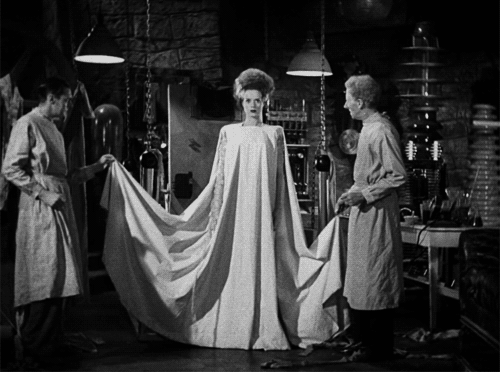
And lest you think this is an outlier, let me introduce you to Dracula's Daughter, aka the Carmilla adaptation with no lesbian overtones, no sirree:

Yeah, queercoding is absolutely A Thing in classic Hollywood horror. It's part of why horror movies are as much of A Thing in gay culture as they are.
The Hays Code went away in the 1960s, partly due to the fact that Code compliance was SUPPOSED to be the one true path to wide distribution and profit, and yet the genderbending comedy Some Like It Hot made piles of money despite not being even CLOSE to Code-approved.
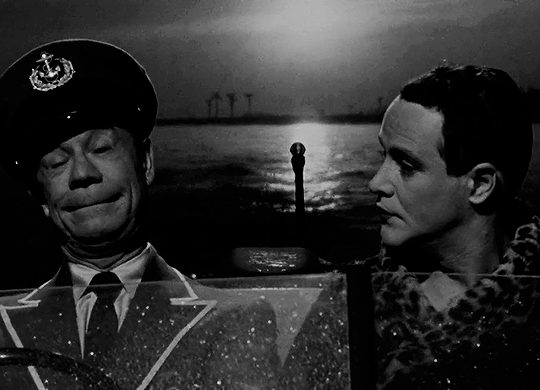
But 30 years is long enough to develop an entire cinematic language, and the legacy of the Hays Code lives on in things like queercoded Disney villains.
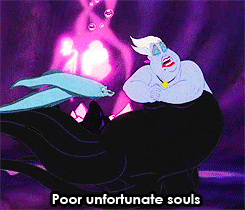
Now, let's talk about Werewolf By Night. A movie made under conditions not dissimilar to those of the Hays code in that Disney, for all its vaunting of First Gay Characters, absolutely refuses to put those characters in anything with wide distribution in such a way that they can't be edited out for Singapore.
So if your choices are 1) No Gay Stuff, 2) Easily Deleted Gay Stuff, and 3) Gobs and Gobs of Queercoding That Can't Be Removed, and you're making a retro black-and-white horror movie, you may find that option three makes the best, and queerest, movie. The cinematic language is all there for you, and you know at least some of your audience will pick up what you're putting down. And at this point, it's practically a genre expectation.
Now, I want to be clear about something: coding of any kind is, by its very nature, subject to interpretation. If we say something is queercoded, we are NOT saying that it's explicitly queer or that no heterosexual explanation exists or whatever. That's not how coding works. Queer theory and queercoding are a lens through which to look at a work. Sometimes queercoding is even unintentional; it's baked into so much American media by now that tropes like queer-coded villains sometimes happen not for particularly queer reasons but because an actor decided he wanted to sound like the villain in his favorite black-and-white movie. When I say WBN has queercoding, that is ALL I'm saying--that the coding is there. (And yes, I do realize this is the piss-on-the-poor website. Sigh.)
Queercoding is also not queerbaiting; the latter is where a piece of media deliberately builds up the expectation of expressly queer content and then refuses to deliver, often while mocking queer fans who fell for it. (Looking at you, Sherlock and Supernatural.) Queercoding may be used for queerbaiting, but the terms are not synonymous. Because WBN makes no queer promises (no romantic promises at all, really), it cannot be said to be queerbaiting.
So with all that in mind, let's look at coding in Werewolf By Night. And because he's the protagonist and everyone's favorite woobie, we'll start with Jack.
Look at this man. Enjoy him.
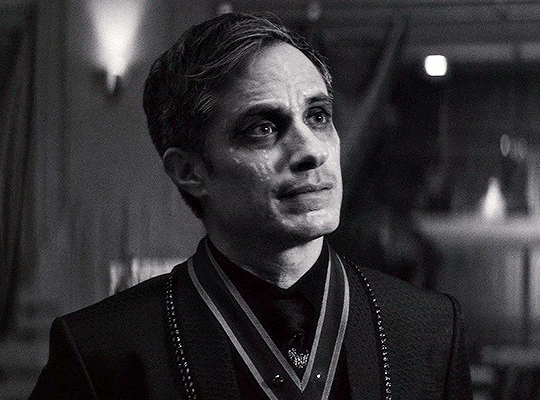
He will be the subject of Part Two.
#werewolf by night#queer theory#queer studies#werewolf by night meta#hays code#film history#long post#media studies and writing hacks with kat
41 notes
·
View notes
Note
the subtle racism portrayed by Julie Plec and TVDU (especially Klaroline fans) fans as well towards Michael Trevino (Tyler Lockwood) is something that will always irk my soul. Both the actor and the character were done SO BADLYYYYYY. I know that since Tyler is written as a white character, technically his writing wasn’t “racist”, but I have reason to believe that Julie may have written him the way she did due to her issues with Michael Trevino.
What do you think about Tyler Lockwood? I think he definitely is one of the characters with the most potential besides Bonnie, etc. Most of the POC in the show (actors/characters) had the most potential and were sidelined.
IN FACT, I can say the same about Enzo! Yeah, Enzo St John is a canonically white character, but Michael Malarkey is a mixed race man (Italian/Palestinian-Lebanese), and we know how Julie is towards POC.
Like I’m not trying to blame all the bad writing on racism and discrimination, but all the POC actors/characters have shitty storylines and a lot of them are racist.
Lucy, Sarah Salvatore (the black Salvatore), Enzo, Tyler, Marcel, Vincent, Bonnie, Qetsiyah, etc.
Coincidence?
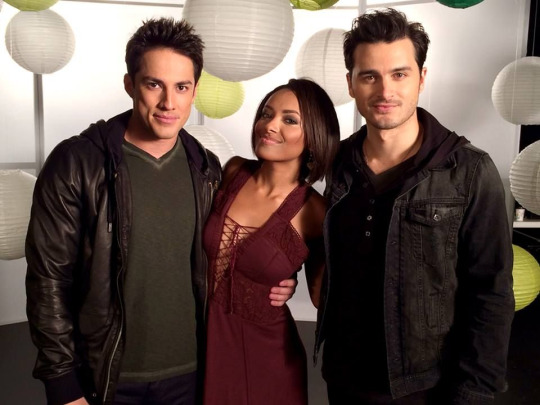
Whenever I discuss race, I do want to preface it by saying, I am white so I am speaking from that point of view. If you disagree or have another perspective, I would love to hear it.
That being said, I don't even think we can call what happened on the set and in the show "subtle" racism. There was such overt racism throughout the show that it is hard to discuss the show in any way without discussing racism. Just because Julie Plec doesn't view her actions as blatantly racist, it doesn't mean they are not.
Just the fact that they had two actors who are ethically not white but were portrayed as white is telling. Both Michael Trevino and Michael Malarkey were made to appear white in the show when there really wasn't a necessity for it. Tyler being Mexican could have added to the history of the wolves or it could have even come from his mom's side, allowing them to cast a Latina woman. For Malarkey, his race isn't really discussed but it would have been so easy to show him making Bonnie a nice Lebanese meal when they were staying at the cabin (cause lord knows the zionists running the show wouldn't allow him to be Palestinian). I also personally just like Tyler and Enzo more than Damon. I would have been fine with killing Damon off earlier to allow more screen time for them.
A year or so ago, my friend began watching the show for the first time and by the time we got to The Originals, as soon as Sabine walked on screen, she said "Does she get killed this episode?" People of color, especially women of color, were treated as disposable by the network. To the point that Tyler and Enzo likely only survived as long as they did because they were "white" characters. But it is also still obvious how much worse they were treated than any other side characters. Tyler and Enzo are both killed in such nonsensical ways and then they have no justice or even mourning. Tyler was a lifelong friend of the Mystic Falls gang and yet Damon isn't even sternly lectured for killing him for zero reason. Tyler had escaped the supernatural world. What was the point of dragging him back on the show just to kill him and have Damon suffer no consequences. He was Caroline's first epic love and she just forgives Damon for it? And what was the point of Enzo's death? Just to make Bonnie suffer more? Just to make her attend the wedding of his murderer? I know Stefan had his humanity off, but that doesn't change the fact that Enzo was dead and Bonnie was still grieving.
Moving on to how the fandom treats them. There is honestly so much hate in this fandom sometimes, and you're right, there is definitely a racial element to it. The way Tyler is treated by the fandom is so telling. I don't know if a lot of the fandom even knows Michael Trevino's ethnicity, but he is clearly seen as "other" or "less than" by the fandom. We also have to acknowledge how his "angry outbursts" are seen as unacceptable but when Klaus does it, it is because he is just so "passionate." The scene where Caroline keeps pushing Tyler to forgive her for sleeping with his mother's killer comes to mind. He snaps but he makes no move to touch her, and this is after repeatedly telling her to leave and her pushing his boundaries. I have seen the fandom call him "disgusting" and an "abuser" because of this, celebrating the fact that Stefan punches him. Stefan uses physical violence against Tyler's words, yet Tyler is the abuser? Then we have, Klaus, who runs her through with a coat hanger and bites her because she said something slightly rude to him and he is praised for "saving her life." It's hard to believe there isn't a racial element here. I often say Klaus gets pretty privilege, but why isn't that awarded to Tyler? Because we can't deny that Michael Trevino is attractive (I'd say more attractive than Joseph Morgan but y'all will come for me).
There was so much left of Tyler's story. The fact that they even had the Lockwoods as the protectors of Inadu's bones in TO would have been a perfect way to bring him back. Can you imagine Hayley or Klaus having to go beg him for help? It would have been such an amazing moment. But no, instead they bring Matt Davis onto the show to make sure he could infect every single spinoff.
You mention all of these characters and that's just in TVD. TO was no better. One of my mutuals recently got into a Twitter 'discussion' with one of the writers and the writer attempted to claim that the Mikaelsons were white supremacists and that was the point of TO, to show it was bad. Yet, when did they do that? How did they show being a white supremacist is bad? The Mikaelsons were at the top of the food chain the entire time. Yes, they constantly had people coming for them, yet they always won and the writing was always done in a way to make the audience root for them to win. How many POC characters were sacrificed in order to prop up the main characters throughout the shows?
Whenever we talk about racism in the show, we have to talk about Bonnie. Bonnie was constantly having to sacrifice her own wants and happiness in order for her white friends, and even enemies, to get what they want. Often when she set a boundary, the fandom villainized her. According to the writing and the fandom, her entire purpose was to serve the white characters. That is blatant racism.
But it's not just Bonnie. It's her entire ancestry. The fandom seems to believe Emily is Katherine's friend in the flashbacks, but she is clearly either being enslaved or at least some type of servant to Katherine. We can go all the way back to Ayana who Esther stole her spell to create the vampires. Or to Qetsiyah who was cheated on and used in order to aid the white doppelgangers. These things separately may not raise any flags, but the fact that we see it happen repeatedly throughout the show tells us it's more than just a coincidence.
Let's not forget Damon was not a confederate solider in the books. Julie added that. And yes I know he deserted but he says it is basically because he was missing Katherine, not because he morally opposed what he was fighting for. They added the founding families and yet didn't make the Bennetts apart of it even though they had been there longer than anyone. They were actively celebrating slave owners. Tyler's mom makes a passing comment of why they have the chains in the cellars and everyone just moves on. They chose to have the Mikaelsons live on a plantation in New Orleans. They chose to hire a very white cast and make it even whiter by white washing and killing off POCs.
Sure TVD is set in Virginia, but Virginia is only 65% white. So why was the cast 99% white? Then they create a whole show in New Orleans where 59% of the population is black, yet we still have a majority white cast? And when they introduce POCs it is usually to serve the white cast. Both Vincent and Eva were brought on so there bodies could literally be used by the white characters. Eva and Vincent's trauma were completely neglected and Eva was even killed off to allow Rebekah to use her body as she pleased whenever Claire Holt wasn't available to be on set. I've already discussed the difference in how Aurora is treated versus Celeste by the show and the fandom. You can read that here. Marcel is constantly belittled and sidelined, even after he is upgraded. There are so many witches of color in New Orleans, yet Davina is the most powerful? Why couldn't she have been played by a POC?
The show repeatedly dehumanizes people of color, especially the women. It's not a coincidence. It is pure racism. And because the show does it, the fandom does it. I am not taking responsibility away from the fandom. Each individual person should know better. But media is supposed to influence society. If we grow up with media that glorifies and celebrates different races, cultures, ethnicities, the fandom will begin to as well. Julie had no desire to do that. All she cared about was ratings and her own racist viewpoint of the world. She could have done more research, or hell, even just listened to her cast, but she chose not to. The writing of the show suffered because of it, but even worse the actors and even fans suffer because of it.
There are so many great creators in this fandom who are POCs and I highly suggest following them. They are able to give better insight in the discussion of racism in the show. But please keep in mind, they do not owe you their time or energy. It is up to each of us to do our own research and learn.
Thank you for the ask! I hope I answered it. Sorry it was so long.
#it was never subtle#julie plec is racist#anti julie plec#tyler lockwood#michael trevino#enzo st. john#michael malarkey#bonnie bennett#kat graham#tvdu#the originals#the vampire diaries#tvd#anon ask#tvd anon ask#tvd ask#fandom asks#fandom answers#tvdu metas#metas
41 notes
·
View notes
Text
the one about vergil being jealous of dante
i would like to share my girlfriends theory about vergils thoughts during that bridge scene for mission 7 which i full heartedly agree with
so im talking about the one at the bridge. kat just told dante her whole deal and dante and her are cool now. they meet vergil at the bridge and tell dante about how he needs to break into bob barbas jail. vergil says kat can't go, dante says shes done enough, she warns him about this situation, dante says it'll be lovely and winks at her before going
and vergil just...stares at kat
he just stares at kat
the camera specifically pans to him and holds on him staring at kat. so its important to ninja theory that we see this moment, that we see vergil looking at kat here. we are meant to get something out of this.
according to my very lovely and very smart and very talented girlfriend who is also very enlightened and got me to ship vergil and kat, a possibility here is this is when vergil's mindset shifts.
let me explain.
(i also talk about this in my really long post, the really long list of kat and vergil things )
prior to this mission, kat kind of really does not like dante. this is very clear to me with like...most of their interactions and her body language. she doesn't like it when he waves a gun in her face. she doesn't like it when he makes her job difficult and tries not to go with her. she doesn't like how he talks about humanity (she goes to argue with him about this until vergil stops her, which she also does not like). she doesn't like that he doesn't take her seriously when he asks her about her spells (then proceeds to wipe his fingers off on her). she doesn't like that when she tries to tell him things will be rough in limbo at paradise that he looks at her, says he 'likes it rough', then winks. she really does not like that one, we see her collect herself after this moment before she proceeds to talk to vergil because she does not like it. she does not seem to like how he's not taking a lot of things seriously. she does not like the confused tone he takes when he questions her going to limbo to escape her 'nightmares' (code word for kat's abusive household) because he doesn't understand how things could be worse for her then limbo.
and it's fair to note that there are moments between these moments where they get along! they have a bonding moment in mission 4 about her learning how to do spells and how the cans remind dante of spray cheese (also notable she's talking about vergil in this scene also, but i digress). they have another bonding moment in virility where they talk about their similar backstories.
but its also important to note she is often frustrated with him at this point in the game. and even more important that vergil knows that she's frustrated with dante. the singular conversation we see between kat and vergil in the game is about how kat doesn't trust dante and she finds him frustrating. this was so important for us to know it is the singular scene kat and vergil have alone in the entire game and we get it in the second mission of the game. she asks vergil if he thinks this will work because she thinks it won't, because she distrusts dante so much after just having met him she's doubting this whole plan they put together.
i've rambled enough though my point is this. kat does not like dante for a good chunk of the early game and she does not trust him.
but by the point of the bridge, she does.
it's fair to say the game is, in part, about dante and kat's relationship. it's about dante learning how to trust kat. but he does that pretty quick, the bigger part is dante getting kat to trust and like him. which he seems to figure out very quickly she does not. you can see it in the fact that he stops making comments like he does after mission 2. he instead focuses on trying to get to know her.
now, this i think ties into my meta on mission 19 where i talked about how dante is smarter then we give him credit for. certainly some of this is him trying to figure out the situation he's found himself in and kat is an in to learn about that situation. he's correctly deduced that kat and vergil are close, so kat is very close to this organization and the plan and probably knows a lot about this whole thing so he can learn about it through her.
but he also seems to genuinely want kat to trust and like him, given he is from very early on, pretty vulnerable with her. he tells her about his childhood before she gives him the details on hers and everything. he realizes to get her to trust him, he needs to trust her.
which gets us to the car scene.
i've talked about the car scene in my really long 'every single kat and vergil moment' list post. but i'm going to do that again here from a slightly different angle, that being the dante and kat relationship growth angle.
this scene is key because its where kat finally decides to trust dante.
she finally lets her walls down (kats theme playing, her hood coming down, all those fun little cues) and she tells him about her past, about vergils role in it, and about her goals. it's an interesting scene. i mean dante flat out tells her he trusts her and he wants her to trust him. he flat out tells her that he wants to know about her, and also vergil. he flat out tells her she can trust him to finish this with her. he's very upfront, he's very vulnerable, and he's very honest, something kat seems to resonate with.
i think up to this point we're seeing a slow progression of kat getting to know dante, getting to know how they're similar (in both conflicting and complimenting ways), and relating to the fact they had similarly traumatic experiences in their lives.
dante is not like vergil. he lacked the privilege's vergil clearly grew up in with his wealth, both adopted into and self made, and just the general stability of his up bringing. dante and kat have a lot in common in this way, it's a lot to relate to that vergil just...can't understand, not on that level. and like i said there's a lot of similarities with kat and dante, vergil flat out compares them in the aforementioned mission 2 scene ('he's raw. like you were when i first found you' or whatever the direct quote is).
so, this is where we are at with the bridge scene.
this is all that's happened.
from vergil's point of view he, notably, knows directly that kat does not trust or exactly like dante. he knows this has been hard for her. he knows that kat and dante are similar people. he knows that kat and dante just spent a lot of time together.
he knows there are just some things about both kat and dante that he is just never going to understand.
and then we get to the bridge. we get to the bridge and kat and dante are getting along swimmingly. dante is protecting her, saying she's done enough, that he doesn't need her to come with him. dante winks at her and kat doesn't do anything in response (unlike the last time dante did something like that). they're, fairly suddenly, fine. especially if we assume, as ninja theory implies, this is right after the drive and this is the first time vergil's talked to either of them since the phone call in the car.
for vergil, this is probably...very jarring, say the least. you go from kat having to calm herself down before she talks to you when dante tries to flirt with her, to her just being largely indifferent when he winks at her.
i've said before that, to me, vergil's downfall recontextualizes the entire kat/vergil relationship we see in game. because vergils downfall very loudly asserts that in some way he cared for her. he cared for her more then he cared about anyone else. we know this because when he's asked what he'd change, what would he do differently, the only thing vergil thinks of is his relationship with kat. that is it. that's the only thing that comes to his mind. we know this because the first third of vergil's downfall is him trying to save kat, again, with no hesitation. we know this because kat is the only figure in vergil's downfall he tries to explain himself to and she is the only person he has to turn into a monster before he can kill them. we know this because hollow vergil tells vergil that everyone he cared for, everyone he loves, hates him now and that includes kat.
it doesn't matter what way he cares about her, selfishly, platonically, romantically, whatever. he cared about her. in some way he loves her.
which brings me back to this moment were vergil stares at kat after dante leaves. this long hold of the camera while he does nothing but look at her, suspect.
and we get to my girlfriends theory that this is the moment where everything changed for vergil.
vergil's motives are...mysterious to us, say the least. we know he wants to save mankind, according to him. we know he makes some points that make sense (someone has to be in charge of the demons but who said it needed to be him). we know that, the biggest issue, is him lying to the others and his general regard of humans as weak despite everything kat does.
my girlfriend posits in this moment, vergil convinces himself that something is happening with kat and dante and he gets jealous. that he thinks he can't compete with his brother for kat (in whatever way, romantic or platonic) and that he no longer trusts either of them in the way he did before. he wants to, but he doesn't. this is the moment his focus shifts to the plan above all else, and this is the mentality we see him remain in for the rest of the game. and that it's here that he decides not to tell them about the ruling mankind plan (me and my girlfriend argue this plan develops during the game for him, but its fair to argue that he may have come up with it before the events of the game. it's also fair not to agree with me about any of this, it's a game from 2013 about killing demons like...it's fine)
we have evidence of this, also in downfall. it's the way hollow kat and hollow dante talk to him.
kat emphasizes that dante is a real man, and vergil is not. she emphasizes that she prefers dante, stoking fears vergil seems to have because its these escalating talking points about dante that lead to her turning into a demon. dante, similarly, stokes at vergil feeling inferior to him. he emphasizes vergil being the 'little' brother (if he means younger or if he means something else, up to you to decide). he points out how he'll always be the better one, the stronger one, the more powerful one. all culminating to him also being killed off.
i think the game is making a very clear point in this, all starting with that stare.
vergil wants to love his brother, he probably does, he's his brother after all. he even says in the game and hollow vergil's point still stands.
but he is also jealous of dante. there's a lot of jealousy about dante. and i think that jealousy fuels a lot of his actions and this moment, that stare on the bridge, is the moment that it really starts. when vergil sees dante as a threat to this relationship he has with kat and he just no longer trusts the two the same as he had before mission 7.
my girlfriend has always argued this and i think she's very right and very smart.
#i wrote this very fast on a whim so im going to post it very fast and on a whim#dmc reboot#devil may cry reboot#reboot vergil#dmc kat#reboot dante#dmc devil may cry#vergil/kat#kat/vergil#fab talks meta
35 notes
·
View notes
Text
what's so interesting about the Forehead Touch(tm), is how vastly different people's interpretations of it are.
some people saying it was strictly platonic/familial, given the start of furiosa and jack's relationship and how furiosa has only given and received the forehead touch from others who were her family, like her mother or women from the many mothers. but when I first saw it, I explicitly saw it as romantic.
this is not to say that you have to read their dynamic like that, that's not it. the great thing about them, was that Romance was not directly shoved in there and you could read it however you wanted to, like furiosa and max. to some, the forehead touch was an outright showing of a familial bond, but to me, it was the showings of a romantic love.
maybe it was because when I started reading early reviews of the movie ppl mentioned jack as the romantic interest, so I already had him placed in that column by the time I saw the movie. but honestly, when I first watched the trailer before seeing anything else, when I saw that split second embrace of the two of them - my first thought was 'oh he's going to be a love interest.'
and it was because of the forehead touch!
that moment of connection, even in a millisecond during a trailer, just bled something more to me bc having seen fury road, I knew how important the Forehead Touch was for furiosa. that this had to be someone deeply important, someone she holds dear, and, I dunno, even though that could still be familial, it totally rang romance to me. and I think another part of it, was because she didn't share that with max.
her and max grow close as they fight together, and at the end there's that really kind, tender scene where he's cradling her head as she lays back from her injuries. it showcased a very intimate moment, but not once did it read romantic to me. and, again, furiosa never does the forehead touch with him, something very sacred to her - so when I saw her extending that embrace to a different man in this trailer, I immediately knew Something Was Up.
I don't really have a conclusion - it's just interesting! some people cement their relationship as platonic bc furiosa only did the forehead touch with family members, whereas others see it as romantic bc she gave that gesture over to jack. so many interpretations!
and this is to say, all of them are valid! if you believe they're platonic, great! if you believe it's romantic, yay! their dynamic was, I believe, explicitly non-specific, so the audience could take it as they want, and so we could simply just focus on this sacred bond of trust between two people, and how important it was to furiosa during her story.
just don't shit on other ppl's interpretation 👍
#furiosa#furiosa a mad max saga#mad max#and this is coming from someone who was DIRECTLY against any romance going into the movie btw#but they won me over with how soft and good to each other they were#ppl like 'furiosa doesn't need a boyfriend!!!" like no she DOESN'T but that's not the POINT#rather then 'need' instead she should GET to have someone in her corner#she spent so long alone suffering with no one to help her after her mom was killed#and then here comes jack who is kind and patient and literally just wants to HELP#and over time furiosa gets to have someone at her side to help her IF she needs it#also some ppl are against it bc they assumed furiosa was a teen near the end of the movie#whereas I straight up assumed the whole time that she was in her early-mid twenties#like anna taylor-joy is young but she's not THAT young#she very much looks Grown to me not a teen#she's actually 28 which is my age and that's............scary#thinking she grew up with the same cartoons and music I did#some 28 year olds make million dollar movies others sit on their couch eating kit-kats#making meta about the movie THEY'RE in
13 notes
·
View notes
Text
It's kind of wild to rewatch parts of the Clone Wars and just. remember what canon is. Because I'm unnerved all over again by the Valorum part in TCW where he and Yoda are talking about Sifo-Dyas, and Valorum says point-blank that Sifo-Dyas was assigned his mission regarding the Pykes without the Council's knowledge. The fact that the Senate can completely and totally bypass the leading body of the Order and tell a Jedi to do something really makes it clear that the Order has no power compared to the Senate, in a very unsettling way.
625 notes
·
View notes
Note
Hi, I'm genuinely curious why you have called Elsa "abusive sister"? What's your, as an Anna lover, main take on Elsa?
Context for my comment.
Realizing on a reread that you asked for an Elsa analysis and I kinda made it an Anna one. They're entwined, though -- it's hard to talk about one without the other, especially when the first question is why call Elsa abusive? The short answer is I was being very reductive in that post for the sake of brevity. The tag directly after is me saying in a quick, off-the-cuff way that Elsa's not wrong:
#see: Anna of Arendelle #suffering is good! #filial loyalty should trump logic! #dying for your abusive sister is good! #Elsa obviously has her own issues but from Anna’s pov?
Believe me when I say that I can go full Elsa apologist very easily. Send a second ask if you want to see that, actually, I do have a lot of Elsa Thoughts. The thing is, there's a ton of Elsa fans out there and Anna tends to get the short end of the stick, despite being - in my opinion - the better sister, and not for nothing, but I think Elsa would agree that Anna is a better sister.
The tragedy of Frozen is that Elsa isn't wrong to isolate herself and try to keep Anna safe, and Anna isn't wrong to sense her sister still wants to connect and try to make it happen. That's what makes it tragic. Anna's desperate attempt to reconnect at the party is what makes Elsa balk, and Elsa balking is what pushes Anna away into the arms of someone who isn't afraid to tell her she's wanted. (Of course, Hans isn't afraid because wanting her won't kill her the way Elsa is pretty sure wanting a sister will.) Anna coming back from a whirlwind of having fun - having a friend - for the first time in years and telling Elsa she wants to get married freaks Elsa out, because Elsa's about to lose her sister to some stranger! Elsa tries to get the situation under control the only way she knows, which is to get away from everyone and self-soothe, but Anna is fed up and presses the argument then and there, which sets Elsa off and reveals the depths of Elsa's problems.
But critically, Anna's not wrong, and she's not stupid.
A major theme of Anna's character is that nothing is explained to her, and she is mistreated as a result. We, the audience, understand why Elsa locks herself away. We, the audience, skip over literal years of isolation for Anna in a three-minute song. We, the audience, see Elsa's anxiety when alone or with her parents. Anna, on the other hand ... to pull from the musical, which I admittedly like more than the film:
ANNA: ... Truth is, I never knew why my parents ordered the gates shut, why the celebrations ended, or why Elsa stopped talking to me. All I ever knew was, I missed my sister. I spent years trying to figure out what I did. I begged to know, to understand, but all my parents would say is, it’s for the best.
Anna blames herself for the fact Elsa locked herself away, and Elsa does not, as far as we see in the story, disabuse Anna of that notion. Sure, you can argue it happens offscreen somewhere after the show, and I'd agree that the arc of Frozen means the girls are going to sit down and realize their parents kinda sucked and gave them both trauma, but that happens after. (Frozen 2 doesn't exist in my head. I don't hold with anything that doesn't admit their parents fucked up big time. The best you can say is they tried to help their daughter, and that is tragic too, that nobody was able to help them do it.)
From Elsa's point of view, she ran away and Anna followed - against Elsa's advice and orders. Elsa felt confident enough to let her sister in and talk about things -- and Elsa couldn't handle it. She shot Anna in the heart as a result, putting them exactly back where they were when they were kids and Elsa was the biggest danger to her sister. Elsa was right to be afraid of intimacy, she was right to protect Anna from herself. The biggest danger to Anna was always Elsa.
This verges into Hans apologism, but we're focused on the girls so stick with me: Elsa literally kills Anna in the story. Hans is a big asshole about this little, "If only there was someone out there who loved you," speech, but he didn't kill Anna. Elsa did. If Elsa hadn't shot Anna in the heart, Anna would not be dying now. If Hans was going to kill Anna, that would've been the place -- and instead he leaves her to die of the wound her sister gave her.
So how does Anna feel in that moment? Narratively, we focus on the fact Hans has been the biggest dick lately, so she's heartbroken by that, but I'd posit she's been let down by the two people she thought might want her: Elsa and Hans. At this point Anna was probably thinking she could get cured and maybe that she and Hans would fix this together.
Instead, her unending faith in her sister should have brought her to this conclusion: Elsa killed her, Hans refused to save her, and they've both abandoned her for dead. In the film, Elsa - by proxy - throws Anna off a cliff right after shooting her in the heart. She could not be more clear about locking Anna out. Hans locked her in, but all to the same effect: Elsa's curse is going to kill her.
Does it really matter why Elsa cursed her?
When I say Elsa is an abusive sister, I mean that from Anna's point of view, Elsa lashes out and hurts Anna because of her own pain. We, the audience, have the benefit of knowing why - but we, the audience, also aren't feeling our fingers freeze solid as our jaw locks up with ice, so maybe we're not getting the full effect there.
Frozen's magic system is simple: magic and emotion are the same thing. (Frozen 2 do not interact.) Elsa's powers are driven by emotion, and they can be driven to great heights or great lows. The tragedy is that she doesn't learn to channel positive emotions, so she only knows fear and anxiety, which spiral out of control as those emotions always do. That fear isn't irrational - she's afraid for her sister, she's afraid for her country, she's afraid to let people down - but it is damaging and uncontrollable.
It literally kills her sister.
Anna dies, not because she threw herself under the sword and got diced, but because she turns to ice. She dies because of Elsa's curse, which ironically saves her from being killed in a bloody way. In that moment, Elsa sees her worst fears come true: she killed her sister. In the musical, she sings:
Anna? Anna - no! This is what I feared, this is why I shut you out so long ago. I'm sorry, I'm so sorry ... Look at what I've done to you.
As she realizes this, the magic begins to undo itself, not because Elsa realized the depth of her fuck up but because Anna committed an act of true love. Anna is brought back to life miraculously by her own self-sacrifice because it was pure and selfless. Which is why my final tags were:
#the narrative posits that [Anna's] suffering was good #actually. #and wanting things for herself was Bad actually
Wanting Hans, the seeming first person to value her, was wrong. Throwing herself under the sword for the sister who ignored her until she murdered her was good. In a meta sense, Anna wanting something for herself was wrong, and being blindly loyal was good. She is literally rewarded by being brought back from the dead to be a continuing loyal companion to the woman who shot her in the heart.
At the end of the day, the fact Elsa feels terrible about this both makes no difference and makes all the difference in the world. Elsa has been awful to Anna, and her being able to recognize that is what makes their relationship so compelling. The fact Elsa is also abused is important; she was locked away from society just as much! While Anna was so neglected by their parents that she spoke to paintings, Elsa was being told to just get better, keep it inside and don't freak out. Like many abused people, when Elsa grows up, she doesn't know how to form a healthy relationship at first. Her first fumbling steps end in disaster, and as musical Elsa begs:
This is all so brand new
Let me first learn to crawl
Before I try to walk
On one hand, that doesn't matter, because Elsa did abuse Anna for a period of time, via neglect and outright harm, up to and including murder. On the other hand, it matters more than anything, because Elsa chooses love, chooses to reconnect, finds true regret and wants to be better. Anna forgives her, because she loves her.
It's what makes the bones of this story so tragic and compelling. The love is real and the hurt is real. The difference is that both sisters choose to move past it, and I can see there being a good ending where they repair their sisterly relationship.
But for the duration of the story, and the near-decade before? Anna was abused by everyone in her family, and Elsa has to take responsibility for that before they can begin to heal.
#Kat Answers#Anonymous#Frozen#x: meta#this is a lot of words I hope it explained something#and feel free to ask more!#I have a lot of thoughts about Frozen and how it's about love#And semi-metaphorical doors but only because they're barriers to Love.
38 notes
·
View notes
Text
Listen.
I know that the van Zieks family is British aristocracy, and there's no reason for them to originally be from anywhere other than Britain. I know that the name "van Zieks" is of Dutch origin.
But Barok is The Main Prosecutor In An Ace Attorney Game™, which means that, like the others, he must be
a) angsty man with tragic backstory;
b) German; or
c) both
Obviously I gave him a German accent when I played TGAA. What, you want me to break from the established formula?
#for the record i'm counting edgeworth as both on a technicality#since he was taken in by von karma and (presumably) lived in germany for years#kat chats#ace attorney#great ace attorney#barok van zieks#meta#this also makes the bit in tgaa 2-3 where ryunosuke is confused by harebrayne having a british accent despite being from germany 10x funnie
27 notes
·
View notes
Text

JAMMER LAMMY!!!!!!!!!!!
188 notes
·
View notes
Note
I want to ask about elves!!
What do you think the particular motives of the feanorians who pushed for the second and third kinslayings were? I mean C and C were probably bitter but do you think it went deeper than that?
Why do you think their followers went along with it, twice?!
YAY ASK ABOUT ELVES I HAVE NO INHIBITIONS ATM AND WILL ANSWER ANYTHING
hmmm yeah I think C&C’s bitterness was the main thing – but also the Nirnaeth was such a turning point. Maedhros failed in every way imaginable. He had lost all his personal and political authority, and ofc Fingon was dead (not to mention his close friend Azaghâl and ally Bór! like Fingon’s death was the Main Thing but it wasn’t the ONLY thing) so I really don’t think he was in a state to restrain C&C from doing what they wanted to (and Celegorm is explicitly named as the leader in the 2nd Kinslaying). But the Nirnaeth was where Maedhros and his brothers put all their eggs in the basket of “get the two Silmarils that Morgoth holds instead of the one held by other elves” – and when that effort failed so dramatically, they were like “welp might as well try the one that’s gonna be easier to get hold of”.
In but two remain I put forward the argument that it was Amras who argued most strongly for attacking Sirion – which is partly backed up by an early draft where the twins (then “Damrod” and “Diriel”) are the ones who push for the 3rd Kinslaying, with M&M only going through with it reluctantly. “Don’t let our brothers fall into Everlasting Darkness for the sake of your faulty conscience” is imo pretty compelling reasoning.
Of course this doesn’t answer the question of why their followers went along with it – and in fact we have two extremes, the servant of Celegorm who abandoned Dior’s sons to die in the Second Kinslaying, and the Fëanorian followers who turned on their own lords in the Third Kinslaying. I don’t really have a good answer for why these people went along with their orders for as long as they did (and I am WAY too drunk to make a stab at figuring it out now). But tbh I think if you were still following the Fëanorians post-Nirnaeth, when they were “scattered like leaves in the wind”, you probably weren’t very normal anyway.
#asks#kat-bat-thegreatandterrible#silmarillion#meta#my meta#(I guess?)#feels weird to call these drunk 2am ramblings meta but#the line of miriel
46 notes
·
View notes
Text
Some Catholic commentary for Louis' dates (and name)

So I've recently got to rewatch IWTV again and wanted to dive into a whole bunch of meta posts, with my hope to eventually make a master post of everything to add to my pinned post, but essentially if you'd like to follow along to any, you can find these and a few previous ones (as well as a few reblog geek outs) under "Kats Catholic Commentary" on my blog ❤️
But let's dive right in, shall we?
Now, to add a quick disclaimer, who knows if these are just happenstance or were done intentionally, but my Catholic senses are tingling and allow me a moment to geek out as I try to connect some of these points to a full circle ~
October 4th - is the feast day of St. Francis, a date set by the Church way back in 1228, and at first I was going to make some tongue in cheek reference to the patron Saint of animals and Louis' diet of animal blood lol, but then -
I figured well, let's see if St. Louis' feast day is on the same day, because sometimes Catholic families like to give their kids the names of the Saint's feast day they're born. But nope, St. Louis' feast day is back in August, HOWEVER guess what???
St. Louis is co patron of the Franciscan tertiaries (yes, as in St. Francis) and the Archdiocese of New Orleans!!
I'm already geeking out, and then I look up October 18th, and it's St. Luke's feast day - the Evangelist and Gospel author of the Book of St. Luke - the disciple who traveled with Paul
Why yes, Paul, as in Louis' brother in the show - and part of me wonders if Grace knew the significance of the date she picked? Wanted to imagine her two brothers traveling together in the after life? If that was easier to imagine then her current reality?
So, again, maybe it's just all a random coincidence, but I think it's nice to imagine Louis' family applied some meaning to both his name, and the chosen "death" date to reflect their faith.
#iwtv meta#kats catholic commentary#louis de pointe du lac#iwtv#interview with the vampire#amc iwtv#iwtv 2022#tw religion
65 notes
·
View notes